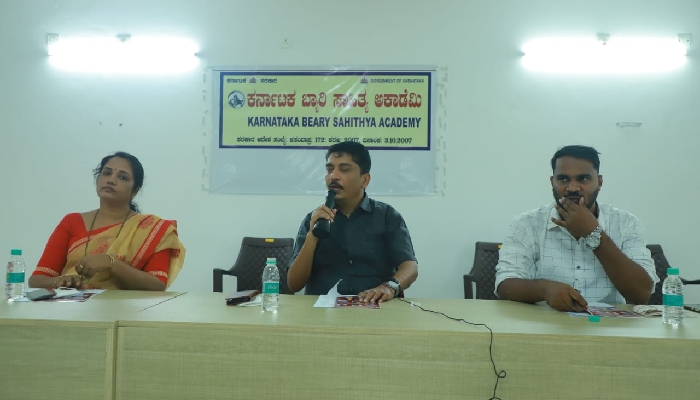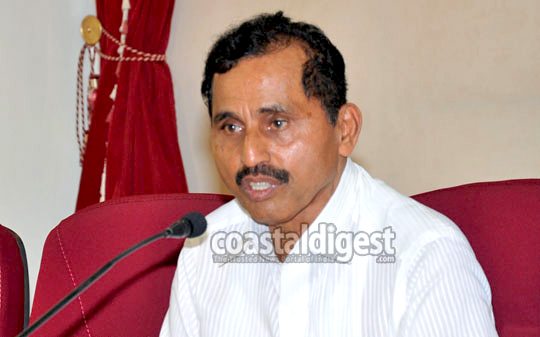
Mangaluru, Aug 4: The Karnataka Beary Sahitya Academy has announced the names of the winners of its annual honorary awards (Gaurava Prashasti and Gaurava Puraskara) for the years 2019 and 2020.
Rahim Uchil, the president of the Academy announced the names at a press conference in the city today. Beary Academy registrar Poornima and member Shamsheer Budoli were also present in the press meet.
Gaurava Prasasthi-2020 winners are: Basheer Ahmed Kinya (Beary literature), Veena Mangaluru (Beary cinema, drama and art) and Siddique Manjeshwara (Beary organisation and social service)
Gaurava Puraskara-2020 winners are: Dr Mohammed Ismail (medicine), T A Mohammed Asif (education), Iliyas Mangaluru (social service), Abdul Rasheed aka Rash Beary (Beary organisation) and Safwan Shah Bahrain (young talent).
Gaurava Prashasti-2019 winners are: Abdul Rehman Kutthethur (Beary literature), Ismail Tannirbhavi (Beary art) and M Ahmed Bava Moidin (Beary organisation and social service).
Gaurava Puraskara-2019 winners are: Abdul Razzak Ananthady (Beary education), T S Hussain (Beary literature), Abdul Majeed Suralpady (General), Asif Karnad (social service) and Ali Kunhi Paare (Beary organisation).
The Academy’s "Gaurava Prashasti consists of Rs 50,000 cash prize, shawl, garland and citation, while "Gaurava Puraskara" consists of Rs 10,000 cash prize, shawl, garland and citation.
Mr Uchil said that the awards will be conferred in a formal function after discussing the dates with chief minister once the covid-19 situation comes under control. Even though the winners for the year 2018 were announced, they weren’t conferred on the achievers. Hence those awards also will be conferred in the same ceremony, he said.
About the winners:
Basheer Ahmed Kinya: He has been involved with the Beary music sector since the last 21 years in the form of singer, and poet. He has provided lyrics for over 150 Beary audio cassettes and also sang them. His first audio cassette, Maskattoru Kallas' had created a record by getting sold out within four to five days. He has also created several non-stop cassettes and Duf songs.
Veena Mangaluru: She has acted in the first Beary cinema. She has acted in over a thousand plays in different languages. 'Mami Marmolu', Kurfat Katte/Amadakaro Chiri, and Shamimarabal are some of the plays she has acted in.
Siddique Manjeshwar: A social worker and activist. Through social media, he led a blood donation campaign and thereby helped thousands of people. There are over 10,000 members in his 54 WhatsApp groups who are ready for blood donation. His ‘Blood Donate Mangaluru’ drive has been able to collect over 26,000 units of blood and conducting over 250 blood donation camps so far. He was honoured with a special award of the chief minister of Kerala.
Dr Muhammed Ismail: Dr Muhammed Ismail completed his medical education in 1989 and has been serving different hospitals since the last 30 years being a highly respected doctor. He also is an honorary medical officer of the Wenlock Hospital Mangaluru. He has served as an office-bearer of Indian Medical Association, Karnataka Medico-legal Society etc.
T A Mohammed Asif: He has been providing education to over 360 students from LKG to the eighth standard through Adarsh Group of educational institutions. He is also active in the social sector and has distributed school bags and books to poor students. During the lockdown, he distributed free food items worth about Rs 10 lac.
Ilyas Mangaluru: He had fought against the menace of dowry. He has got over 500 girls married through an organization, 'Dowry Free Nikah'. He has also created an app, Free Nikah, which helps boys and girls to find suitable matches.
Rash Beary: Abdul Rasheed aka Rash Beary is known for using social media to help the people. By establishing 'Beary Nikah Helpline' he has helped several poor Beary women to get married. He also provides free counselling services to couples from all religions. With the help of donors, he keeps distributing clothes and food among needy.
Safwan Shah Bahrain: A well-known Beary singer, he has sung several songs in past one decade. He has been organizing various Beary programmes in Bahrain for past eight years. He had undertaken the adventure of jumping from the air from a height of 13,000 feet with the Indian flag in hand.
Abdul Razack Ananantady: A PU college lecturer by profession, he has conducted over 500 pre-exam training camps and functioned as a resource person in leadership and personality development training. He has been conducting training and lectures for students and their parents on learning nutrition, and life values. His addresses on education and cultural aspects have been aired by Akashvani.
Abdul Rahiman Kuthethur: He was the co-editor or Beary Kannada - English dictionary and editor of the first-ever Beary grammar book released in 2019. He also is a member of the experts' committee on the Beary language textbook. He has translated Panchatantra stories, Sarvajna Vachanas etc into Beary language and published collection of poems.
Ismail Tannirbavi: He is known as a Beary theatre personality, who started acting at the age of 17. He has acted in over 300 plays including Beary, Tulu and Kannada. He has been in the theatre since the last 55 year and his plays have been presented in countries like Muscat and Kuwait.
Ahmed Bawa Moidin: A social worker and member of the Beary Study chair. He also is the life member of Beary Sahitya Parishad and member of Human Ethical Committee of Mangalore University. He was the founder vice president of Mangalore Merchant Associate and member of divisional railway users consultative/committee. He has donated blood 53 times.
T S Hussain: Hussain is a veteran Beary writer who has defied blindness. He faced many difficulties and challenges in life and also met with an accident in 2008. Because of this accident, his eyesight had become very weak. He continued with the creation of works with determination in spite of failing eyesight with help from friends. He has authored two works and was appreciated for their content. Thereafter, he authored two more works. In 2018, he wrote another work.
Abdul Majeed Suralpady: A social worker and activist, he has served in various organizations. He served as the president of Suralpady government higher primary school for 21 years. He also served as the president of the educational committee of South Karnataka Sunni Centre's Al Ihsan English Medium School and got government recognition for the school. He set up PU college for girls and laid two-way road at Kaikamba besides bus shelter, toilet, drinking water system and building for police check post.
Apatbandhava Asif Karnad: He has been serving as an ambulance driver for the last ten years. He readily carries dead bodies and performs funeral. and done so for over a thousand bodies so far. Whenever he comes across mentally unsound people on the road, he gives them a wash and admits them to Ashrams. He has also been maintaining Maimoon Foundation Apatbhandhava Sycho Rehabilitation Centre.
Alikunhi Pare: He is the founder president of 'Melthene', a forum of Beary writers and artists. He has also served social, literary, organizational and religious sectors. He has been identified with several organizations including Mangaluru taluk Yuvajana Okkota and Dakshina Kannada and Udupi Muslim Central Committee.










Comments
This brahmin kalladka prabhakar bhat sent his son and family to western country to study and misusing lower caste people for his political agenda wake up hindu community try to understand manuvaadi
Add new comment